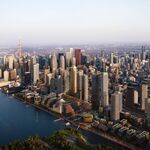andrewpmk
Senior Member
Yes and no. There needs to be some tolling today, no doubt. But the 2nd half of that is to have the necessary transit infrastructure in place to handle the people who will switch to it. As of right now, that infrastructure isn't in place. When GO service gets expanded and whatever Transit City/Ford Plan/Stintz Plan elements get implemented, then we can talk about a large-scale tolling scheme.
But until that time, all you're going to do is piss people off, because you aren't giving them a real viable alternative. The way I see it happening is GO does all the prep work for all-day two-way frequent service on it's lines, and all on one day that service comes online, and a region-wide highway tolling scheme comes online too. Make the clear distinction that "we have improved transit now, so now you have no excuse not to take it". And then use the revenues generated from the tolling to fund Phase 2 of the transit expansion (the DRL, the WWLRT, all those 905 BRT projects, etc).
If you're going to use a stick to try and get people to switch modes, you damn well better make that mode more appealing, and able to handle the influx of new passengers.
I think it is better to start tolling immediately because if we plan to borrow money and toll in the future, then some right wing politician will come into power and discontinue tolling. If we toll now, people will see the benefits of tolling (less traffic congestion). Plus in the short term, there is the possibility of expanded express bus service using the newly tolled roads (e.g. expanding the GO bus service to North York Centre via Highway 401) and people can adapt to tolls by commuting less. Though to ease the transition, we would probably want to introduce tolls gradually - e.g. a peak hour rate of 10 cents a km now, with increases to 15 cents/km in rush hour once certain transit projects open, and with the peak hour toll rates remaining considerably below the 25.2 cents/km+60 cents Highway 407 charges (i.e. set so that we will accept mild rush hour traffic congestion but avoiding severe congestion).




